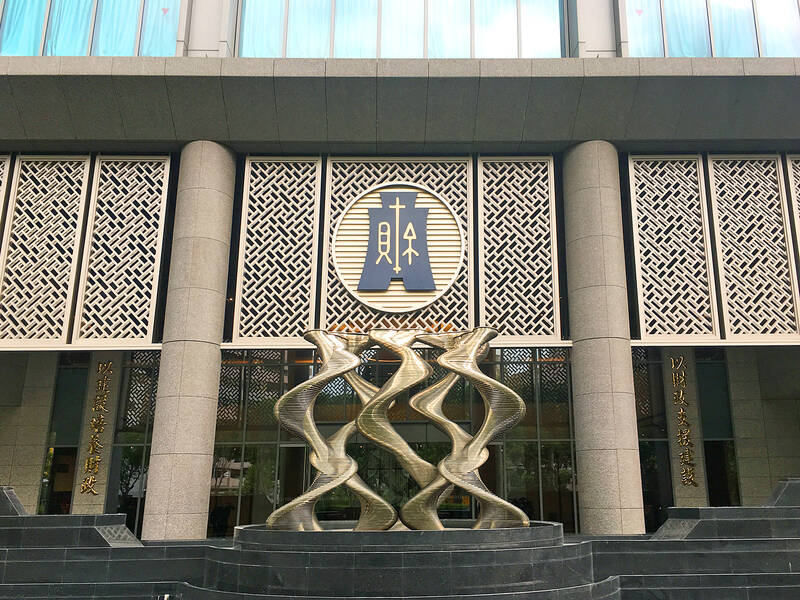Tax revenue last month expanded 20.9 percent year-on-year to NT$365.3 billion (US$11.47 billion), driven mainly by a spike in corporate income taxes that offset declines in securities and property transaction taxes, the Ministry of Finance said yesterday.
Corporate income tax revenue swelled 55 percent to NT$163.4 billion last month, as companies generally reported an improvement in business, although the nation’s exports faltered, the ministry said.
In the first nine months of the year, corporate income tax revenue surged 57 percent to NT$893.8 billion, as listed companies posted a 12.83 percent annual gain in combined revenues.

Photo: Clare Cheng, Taipei Times
The robust corporate income tax revenue would give the national treasury a tax surplus of about NT$300 billion this year, although revenue generated from securities, property and sales taxes appears bound to lag behind targets, Department of Statistics Deputy Director-General Chen Yu-feng (陳玉豐) said.
Personal income tax revenue would also lend support, with revenue in the first three quarters of the year rising 29 percent to NT$562.9 billion, after gaining 1.8 percent last month alone to NT$44.2 billion, the ministry said.
Chen attributed the advance in personal income tax revenue to the extension of capital gains taxes to transfers of presale housing contracts.
Sales tax revenue slumped 16.3 percent to NT$12.2 billion after the government stretched tariff reductions on imported oil, gas and diesel to slow inflation, Chen said.
Securities transaction tax revenue last month tumbled 29.1 percent to NT$12.6 billion, while land value increment tax revenue fell 15.6 percent to NT$6 billion, as weak sentiment drove people to the sidelines, the ministry said.
As of last month, overall tax revenue grew 17.3 percent to NT$2.62 trillion, fulfilling 96.4 percent of the budget planned for this year, the ministry said, adding that the next three months would bring in generous tax surpluses for the state coffers.
Trade groups have pressed for tax refunds to help stimulate consumer spending, as exports could head south amid a global slowdown.

Vincent Wei led fellow Singaporean farmers around an empty Malaysian plot, laying out plans for a greenhouse and rows of leafy vegetables. What he pitched was not just space for crops, but a lifeline for growers struggling to make ends meet in a city-state with high prices and little vacant land. The future agriculture hub is part of a joint special economic zone launched last year by the two neighbors, expected to cost US$123 million and produce 10,000 tonnes of fresh produce annually. It is attracting Singaporean farmers with promises of cheaper land, labor and energy just over the border.

US actor Matthew McConaughey has filed recordings of his image and voice with US patent authorities to protect them from unauthorized usage by artificial intelligence (AI) platforms, a representative said earlier this week. Several video clips and audio recordings were registered by the commercial arm of the Just Keep Livin’ Foundation, a non-profit created by the Oscar-winning actor and his wife, Camila, according to the US Patent and Trademark Office database. Many artists are increasingly concerned about the uncontrolled use of their image via generative AI since the rollout of ChatGPT and other AI-powered tools. Several US states have adopted

KEEPING UP: The acquisition of a cleanroom in Taiwan would enable Micron to increase production in a market where demand continues to outpace supply, a Micron official said Micron Technology Inc has signed a letter of intent to buy a fabrication site in Taiwan from Powerchip Semiconductor Manufacturing Corp (力積電) for US$1.8 billion to expand its production of memory chips. Micron would take control of the P5 site in Miaoli County’s Tongluo Township (銅鑼) and plans to ramp up DRAM production in phases after the transaction closes in the second quarter, the company said in a statement on Saturday. The acquisition includes an existing 12 inch fab cleanroom of 27,871m2 and would further position Micron to address growing global demand for memory solutions, the company said. Micron expects the transaction to

A proposed billionaires’ tax in California has ignited a political uproar in Silicon Valley, with tech titans threatening to leave the state while California Governor Gavin Newsom of the Democratic Party maneuvers to defeat a levy that he fears would lead to an exodus of wealth. A technology mecca, California has more billionaires than any other US state — a few hundred, by some estimates. About half its personal income tax revenue, a financial backbone in the nearly US$350 billion budget, comes from the top 1 percent of earners. A large healthcare union is attempting to place a proposal before